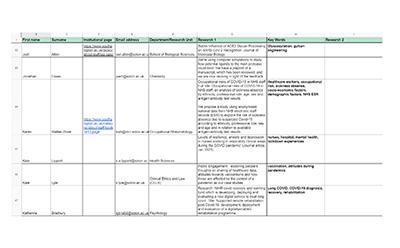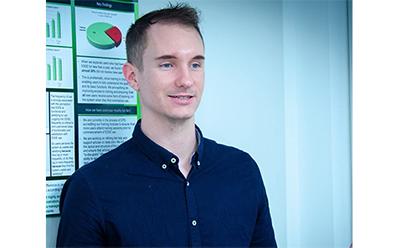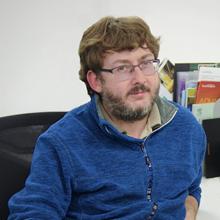
I am Dr Ken Brackstone, Social Research Fellow and Data Analyst based at the Clinical Informatics Research Unit, University of Southampton, and I was recently awarded New Things funding alongside Dr Michael Head, Senior Global Research Fellow, also at the Clinical Informatics Research Unit, to build a COVID-19 database and knowledge translation network between policymakers and researchers involved in pandemic preparedness at the University of Southampton.
Given the urgency of the pandemic response, the global application and translation of new knowledge has never been more relevant. Throughout the course of the pandemic last year, Michael and I acknowledged that there existed a huge volume of high-quality multi-disciplinary projects covering a wide range of policy-relevant activities related to COVID-19. Many researchers involved in these projects had been working in silos and were unknown, relatively speaking, to the wider research community and across the university. During a cup of tea and biscuit over Zoom, Michael and I discussed the potential of Southampton as a pandemic preparedness research “hub”, whereby UoS researchers could connect with local and national policymakers to discuss “freshly baked” research findings, key priority areas of decision-makers, and important knowledge gaps within policy planning.
We first aimed to create a comprehensive database containing all research projects relating to COVID-19 being undertaken at the UoS. Working alongside our excellent project intern, Sophie Ross (just graduated from the UoS MSc Global Health), we designed and distributed a short survey to researchers across all faculties at the university. We called out to anybody who was currently involved in COVID-19 research to make themselves known, and to briefly summarise in the survey what their projects involved. We also scoured published literature, preprints, and research databases (i.e., Google Scholar, Scopus) for any mentions of COVID-19 and Southampton. After several weeks of gathering survey responses and literature searching, we recorded a total of 180 high-quality multi-disciplinary research studies related to COVID-19 and pandemic preparedness previously and currently being undertaken by UoS researchers, which we coded into research themes and keywords. This is the most comprehensive effort to date that has collated all UoS COVID-19 projects. We plan to continue updating this spreadsheet.
Our next step will be to publish a UoS COVID-19 research brochure (provisionally titled “Informing Pandemic Preparedness: University of Southampton COVID-19 Activity and Output”), which will inform, showcase, and celebrate the success of researchers across the UoS and the important work that they have accomplished during the past year of the pandemic. The brochure will serve as an index of all 180 UoS projects currently on our radar, but will also be structured into research themes (e.g., testing, transmission prevention, vaccinations, mental health, environment, and more), which will showcase 4-6 projects in each theme in slightly more depth. Our aims are for this brochure to act as a guide for policymakers in allowing them to learn more about the types of research on COVID-19 and pandemic preparedness being completed at our university. We aim to print and publish the brochure online in June.
The third and final phase of the project involved reaching out to policymakers and decision-makers actively involved in COVID-19 and pandemic planning/preparedness, and to facilitate a dialogue with UoS researchers by tailoring and “matching up” policymakers with UoS researchers by interest and priority research areas. To do this, we distributed a second survey amongst public health staff working in local councils (e.g., Hampshire County Council), research centres (e.g., the London School of Hygiene and Tropical Medicine), and across various social media platforms, to capture policy areas of interest relating to COVID-19 and pandemic/preparedness, key priority areas, knowledge gaps to help in addressing policy planning in the future, and relevant contact information. We have since received responses from various individuals involved in policy planning across the world. This task will be an ongoing effort since policy and research priorities are continuously developing and changing. We will continue to distribute this survey amongst public health groups, where we intend to “match up” and introduce policymakers to the relevant UoS researchers when required.
We also hosted a roundtable discussion with the Commonwealth Secretariat to discuss the longevity of this project. As a result of these discussions, we have been invited to be members of a Technical Working Group to enable collection and spread of health information specific to the COVID-19 response across the Commonwealth. The function of the working group will likely be to facilitate specific technical assistance and policy recommendations to member nations that raise concerns and challenges in their national COVID-19 response and pandemic preparedness. This will work in the same way as described above, in which we will invite UoS researchers to share new research findings to inform best practices and new policy options where relevant. This will deliver timely impact on important issues relating to pandemic preparedness in Commonwealth countries going forward.
Upon reflection of the past few months since commencing the project, and with the tremendous support of our mentor at Public Policy|Southampton, Yaryna Basystyuk, we have developed a greater understanding of how local and national policy works, what is important to policymakers, and how to effectively engage with public policy actors to achieve impact. Most crucially, we have learned that a global pandemic is a remarkably busy time for policymakers, and that a little patience and understanding tends to go a long way. I feel that we have achieved a lot during the first 3 months in terms of output and setting project wheels in motion, but we still have a while to go before we achieve substantial impact in policy. As we continue to build the COVID-19 research database and facilitate the dialogue between researchers and policymakers – not just locally, but across the Commonwealth – it should not be long until we observe hints of influence on policy decisions based on the work that we have developed as a result of New Things funding.
Thank you to everybody at Public Policy|Southampton for all their help with this project: Yaryna, Laura, Giles – you have been a fantastic source of support. Michael, Sophie, and I are looking forward to leading this project into fruition across the rest of 2021.
Related Staff Member

